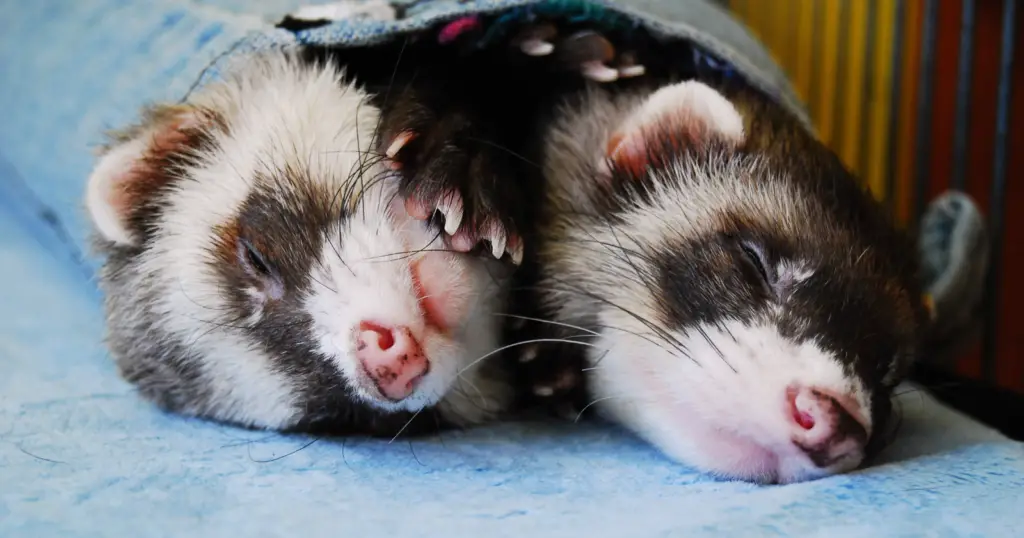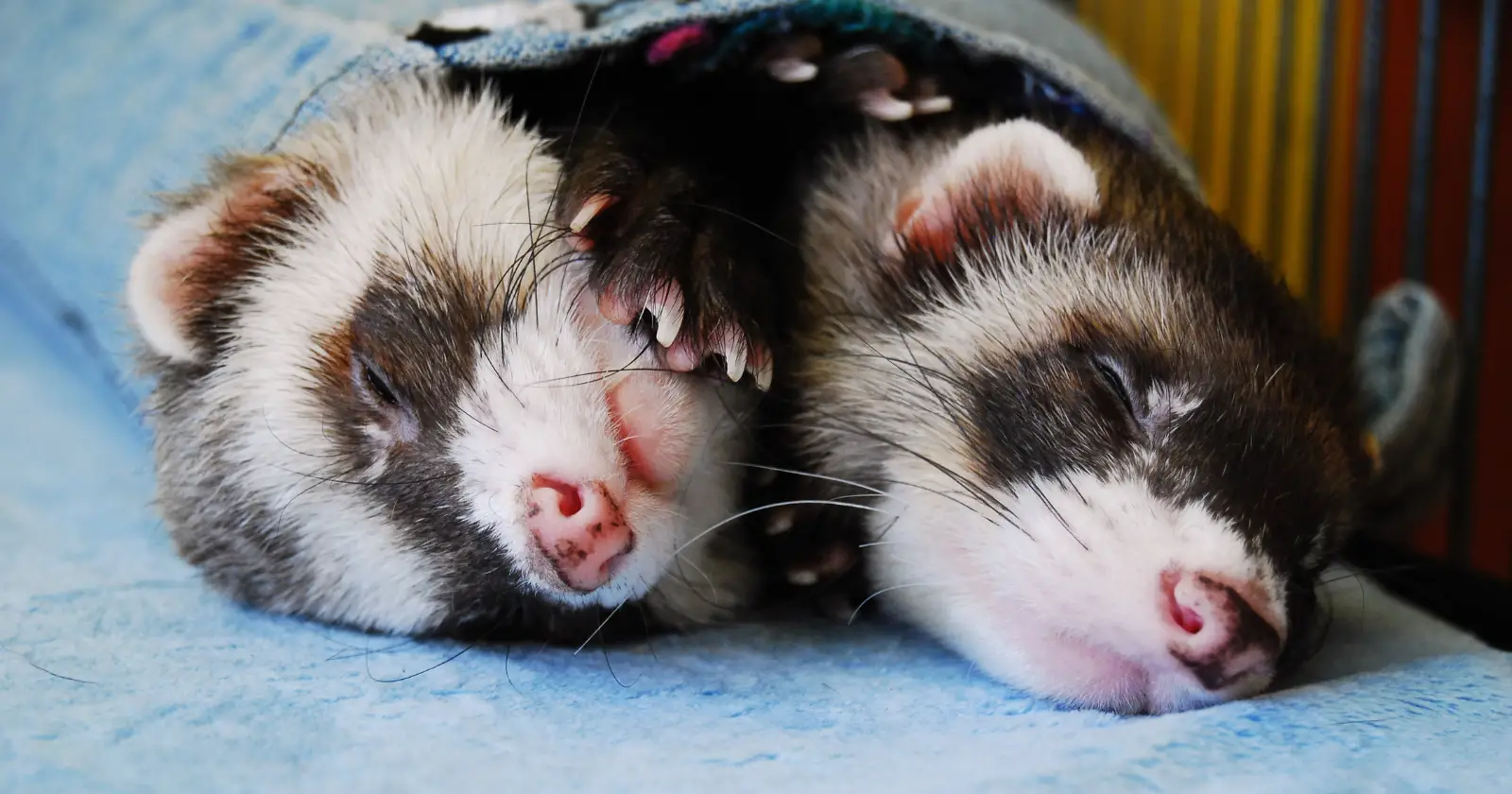No one can deny that ferrets make for perfect pets. They’re cute, friendly, and always have lots of energy to play. But believe it or not, these bundles of cuteness and energy need plenty of sleep to recharge. So How Long Do Ferrets Sleep?
In this article, How Long Do Ferrets Sleep, we’ll explore the sleeping habits of ferrets and the factors that affect their sleep schedule.

How Long Do Ferrets Sleep? Explained
So how long do ferrets sleep? Ferrets can be sleepy little pets and snooze for an average of 14 to 18 hours per day! This makes ferrets low-key pets to own, as you don’t need to spend nearly as much time playing with them as you would with dogs or rabbits.
While other animals may be lonely when left on their own, many ferrets are often quite happy sleeping the day away in their cage while their humans are at work or out running errands.
The funny thing about ferrets is that they are completely knocked out when asleep. But when they are awake, they are full of energy. This differs from a cat, who sleeps similarly but may remain relaxed or lethargic when awake.
So when your ferret is awake, be ready to dedicate your full attention to him, as he will be quite eager to play. Read on to learn How Long Do Ferrets Sleep.
When Do Ferrets Sleep?
How Long Do Ferrets Sleep? When exactly do ferrets sleep? Let’s discover! Ferrets are crepuscular and are active at dawn and dusk each day. Therefore, you may notice your ferret is most active right when the sun is about to rise and around the time it sets in the evening.
However, some ferrets alter their sleeping patterns based on their owners’ schedules. For example, your ferret may sleep through the night and be more active during the day to play with you. Or he may sleep during the day while you are at work and wake up when you arrive home.
Therefore, as long as your ferret seems happy and healthy, you don’t need to fret too much if your ferret’s sleep schedule varies a bit from his natural cycle.
Factors That Affect How Long do Ferrets Sleep
How Long do Ferrets Sleep depends on several factors. It’s important to note that the 14 to 18 hours sleep cycle is average. Your ferret may sleep more or less depending on several factors.
Below are the most common factors that affect the sleep habits of ferrets. After reading these, you may know How Long Do Ferrets Sleep.
Age:
As with most animals, age is a significant factor in ferrets’ sleep habits. If you raise a ferret from birth to old age, you will notice that he will sleep more when he is a baby and when he is an elder than during the rest of his life.
This is because baby ferrets need lots of rest to grow up strong and healthy, so they sleep much longer than adults. Furthermore, ferrets have less energy later in life than they used to, so they need to rest more often.
Watch this video on How Long Do Ferrets Sleep:
Activities:
Like children, a ferret will sleep very soundly after a fun day full of play and activity. So if your ferret sleeps for longer than usual after a play session, it probably means they’re just tired from having so much fun!
In some cases, a very tired ferret may exhibit what is called “dead sleep.” Dead sleep occurs when a ferret is so tired that they appear dead when they are actually sleeping. It can be very difficult to wake a ferret in this state, which can worry some owners.
However, as long as the ferret is breathing and showing signs of life, this type of sleep usually isn’t a cause for concern. Though many factors can contribute to dead sleep, activity and play can easily tucker a ferret out to enter this state.
If your ferret enters dead sleep after a great play session, then take it as a sign that he had a lot of fun and feels safe and comfortable enough to enter such a deep sleep.
Season:
The amount of sleep a ferret gets also depends on the season. Ferrets will sleep longer when it is cold and dark than when it is warm and bright out. Therefore, your ferret will probably sleep longer throughout winter than during summer.
However, many domesticated ferrets may not show a difference throughout the seasons because the presence of artificial light confuses their bodies.
Therefore, it’s best to expose your ferret to natural light to maintain his natural sleep schedule. Ferrets who do not adjust accordingly to the seasons often develop adrenal disease or other health conditions.
Health
If a ferret lives with a health problem, it may be sleepier than normal. That’s because a ferret’s body needs rest to get back to perfect health. As wonderful as ferrets are, they are not immune to health problems.
Some common conditions (such as dilated cardiomyopathy and insulinoma) leave ferrets sleepy and lethargic. Therefore, if your ferret seems more fatigued than usual, you should take him to a vet to ensure he doesn’t have a health problem. Health will surely affect How Long Do Ferrets Sleep.
Environment
Ferrets need an ideal environment to sleep soundly every day. Like many animals, they do best in environments that are dark and quiet. In the wild, ferrets sleep in dark burrows, so you should provide some elements that will allow them to burrow in, such as a box or small pile of blankets.
Furthermore, ferrets can sleep through predictable noise but not anything unpredictable. For example, if you live near a busy street, your ferret will adjust to the noise and eventually sleep through it. However, if you randomly turn on the television very loudly, your ferret will not be able to sleep through that.
Conclusion: How Long Do Ferrets Sleep
While caring for a ferret, you can expect him to sleep for the majority of the day. Depending on the ferret, they may be wide awake during twilight hours (dusk and dawn) or be more active in playing with you in the daytime.
However, don’t be alarmed if you see your little critter snoozing for most of the day. They are naturally sleepy little pets but will be more than ready to play with you when they wake up. Visit ownyourpet to learn more.

